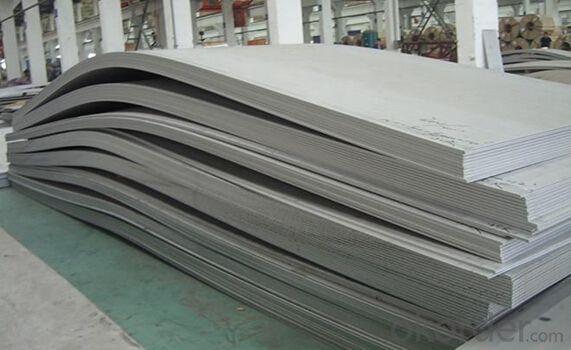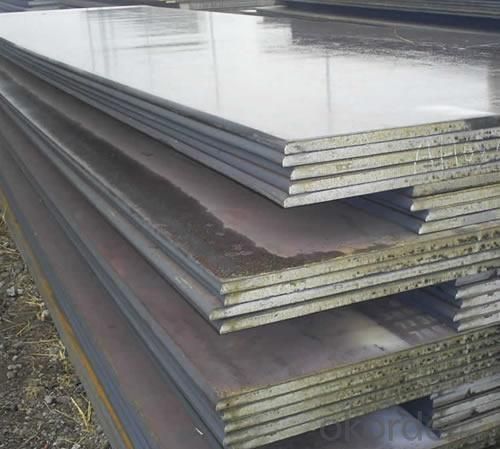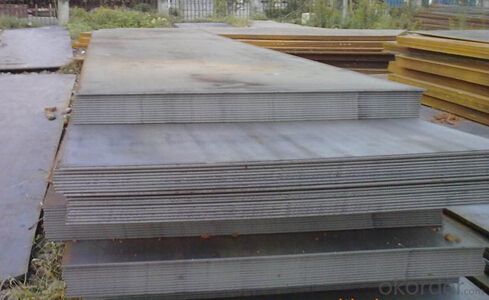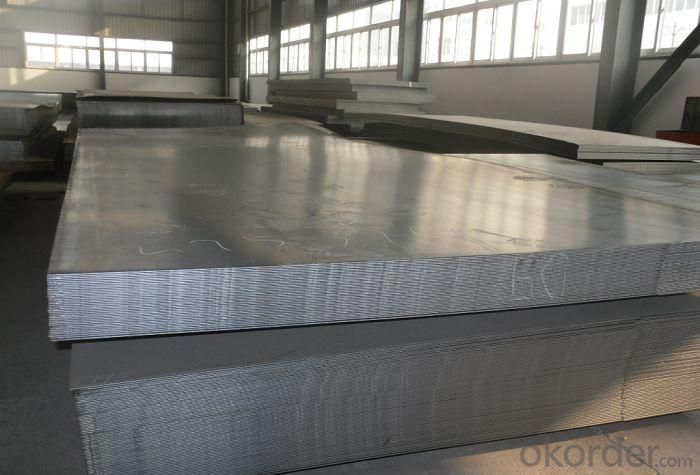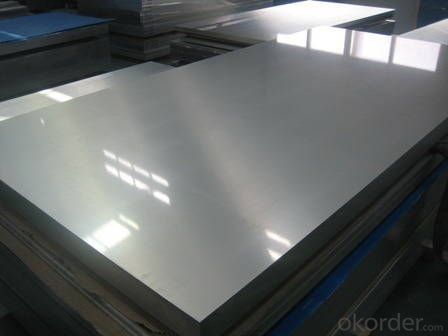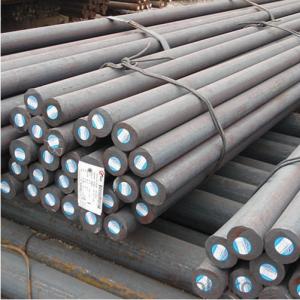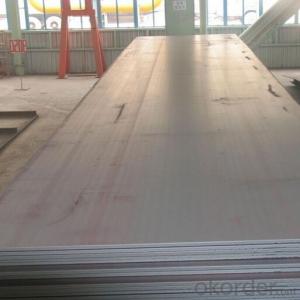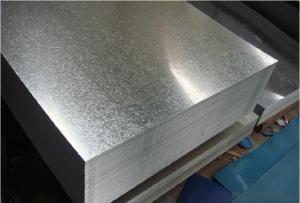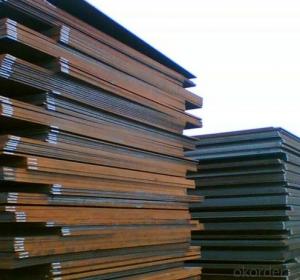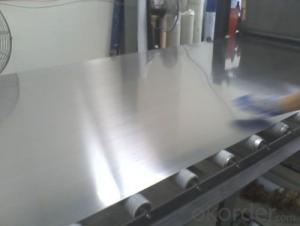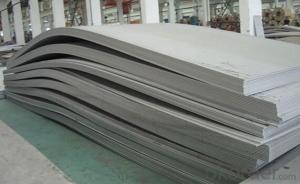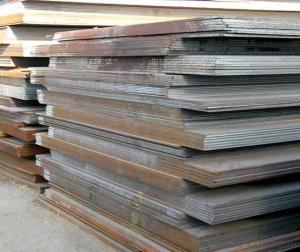S275JR High Strength Carbon Iron Sheet Plates
- Loading Port:
- Tianjin
- Payment Terms:
- TT OR LC
- Min Order Qty:
- 3 m.t.
- Supply Capability:
- 100000 m.t./month
OKorder Service Pledge
OKorder Financial Service
You Might Also Like
Specification
S275JR High Strength Carbon Iron Sheet Plates
Detailed Information of S275JR High Strength Carbon Iron Sheet Plates
| C | Si | P | S | yield Strength MAp | Tensile strength MAp | Elongation % | ||
| S275JR | 0.24 | 0.4 | 0.045 | 0.03 | 250 | 400-520 | 26 | |
| C | Si | Mn | P | S | Cu | |||
| A283 | ≤0.27 | 0.15-0.4 | ≤0.9 | ≤0.035 | ≤0.04 | ≥0.2 | ||
| Thickness: | 6mm, 8mm, 12mm, 16mm, 20mm, 25mm, 30mm, 50mm, 80mm, 100mm, 150mm, 200mm | |||||||
| Width: | 1500mm, 1800mm, 2000mm, 2200mm, 2500mm | |||||||
| Length: | 6000mm, 8000m, can cut to width and length | |||||||
| Packing Details; | according to customer‘s require or export’s standard | |||||||
| Delivery time; | 7 days for stock sizes, 20-25 days for new production sizes | |||||||
| Port: | Tianjin China | |||||||
Related Products Overviews of S275JR High Strength Carbon Iron Sheet Plates
Product Name | Typical Grades | Diameter(mm) | Standard Adopted |
Carbon Steel | 20 (1020/S20C/C22) |
Ø16-Ø300 |
GB/SAE/ JIS/DIN |
40 (1040/S40C/C40) | |||
45 (1045/S45C/C45) | |||
Bearing Steel | GCr9 (51100/SUJ1) |
Ø12-Ø250 | |
GCr15 (52100/SUJ2/100Gr6) | |||
GCr9SiMn (A485-Gr.1/SUJ3) | |||
Cr-Mo Steel | 20Cr (5120/SCr420H/20Cr4) |
Ø12-Ø250 | |
40Cr (5140/SCr440/41Cr4) | |||
42CrMo(4140/SCM440/42CrMo4) | |||
Gear Steel | 20CrNiMo |
Ø16-Ø600 | |
20CrMn(5115/SMnC420/20MnCr5) | |||
20CrNiMo(8620/SNCM220/20CrMiMo2) |
Related Products Application of S275JR High Strength Carbon Iron Sheet Plates
Carbon Steel | l Mold bottom l Plastic mold l Construction machinery parts l Automobile parts l Security grills l Screens l Construction |
Bearing Steel | l Aerospace l Navigation l Nuclear energy l Chemical industry l Electronic information l Petrochemical l Instrument and meter l Transportation |
Cr-Mo Steel | l Mechanism & Fasteners gear l Stressed components for vehicles l Engines and machines l Parts of larger cross-section |
Gear Steel | l All kinds of gears l Statically and dynamically stressed component for vehicles l Engines and machine l Larger cross-section parts l Crankshafts |
Company Introduction of S275JR High Strength Carbon Iron Sheet Plates
CNBM International Corporation is the most import and export platform of CNBM group(China National Building Material Group Corporation) ,which is a state-owned enterprise, ranked in 270th of Fortune Global 500 in 2015.
With its advantages, CNBM International are mainly concentrate on Cement, Glass, Iron and Steel, Ceramics industries and devotes herself for supplying high quality series of refractories as well as technical consultancies and logistics solution.
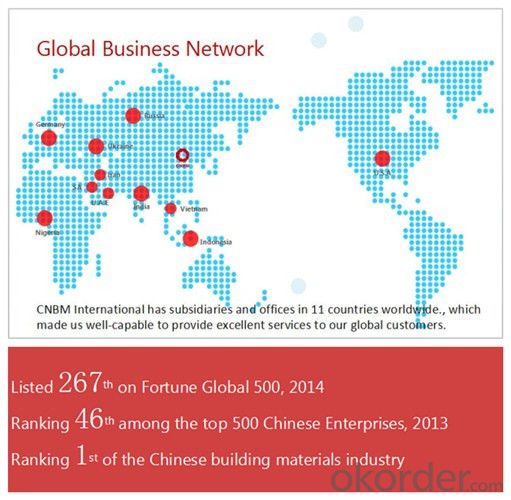
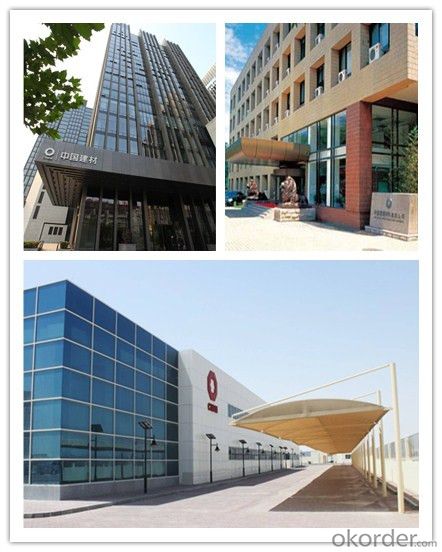
After-sale service | l CNBM provides the services and support you need for every step of our cooperation. We’re the business partners you can trust; you can relax and get on with doing business. l For any problem, please kindly contact us at any your convenient time, we’ll reply you in our first priority within 24 hours
|
Advantages
| l Industry experience over 20 years. l Shipment of goods -More than 70 countries worldwide. l The most convenient transport and prompt delivery. l Competitive price with best service. l High technical production line with top quality products. l High reputation based on best quality products.
|
Packaging & Delivery of S275JR High Strength Carbon Iron Sheet Plates
Packaging Detail | Sea worthy packing /as per customer's packing instruction |
Delivery Detail | 15 ~ 40 days after receiving the deposit |
Products Show
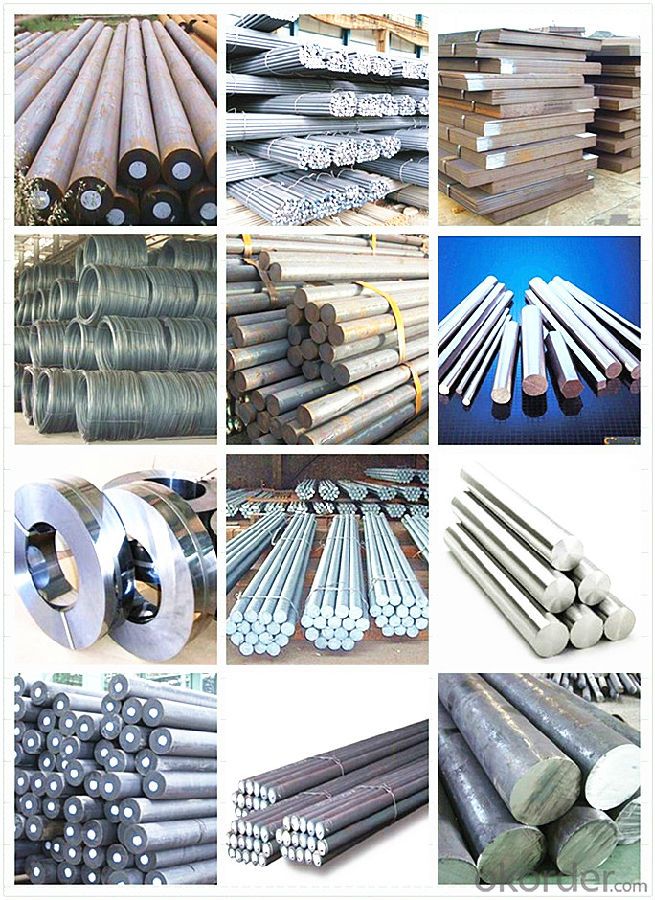
FAQ:
Are you a trading company or manufacturer? | Manufacturer |
What’s the MOQ? | 3 metric ton |
What’s your delivery time? | 15-35 days after downpayment received |
Do you Accept OEM service? | Yes |
what’s your delivery terms? | FOB/CFR/CIF |
What's the Payment Terms? | 30% as deposit,70% before shipment by T/T |
Western Union acceptable for small amount. | |
L/C acceptable for large amount. | |
Scrow ,Paybal,Alipay are also ok | |
Why choose us? | Chose happens because of quality, then price, We can give you both. Additionally, we can also offer professional products inquiry, products knowledge train (for agents), smooth goods delivery, excellent customer solution proposals. |
What's your available port of Shipment? | Main Port, China |
What’s your featured services? | Our service formula: good quality+ good price+ good service=customer's trust
|
Where are your Market? | Covering more than 160 countries in the world |
- Q: How does special steel perform in high-stress environments?
- Special steel is specifically designed to perform exceptionally well in high-stress environments. Its unique composition and manufacturing process make it highly resistant to various forms of stress, such as mechanical, thermal, and chemical stress. One of the key properties of special steel is its high tensile strength, which allows it to withstand immense pressure without deformation or failure. This strength is achieved through the addition of alloying elements, such as chromium, nickel, and molybdenum, which enhance its structural integrity and toughness. The presence of these elements also increases the steel's resistance to corrosion and oxidation, making it more durable and reliable in harsh environments. Moreover, special steel exhibits excellent fatigue resistance, enabling it to withstand repetitive and cyclic loading without developing cracks or fractures. This property is crucial in high-stress environments where components are subjected to constant vibrations or cyclic loading, such as in aerospace, automotive, and industrial applications. In addition to its mechanical properties, special steel is also highly resistant to extreme temperatures. It can maintain its strength and integrity even at elevated temperatures, making it suitable for applications in high-temperature environments such as power plants, furnaces, and chemical processing industries. Furthermore, special steel has excellent wear resistance, which enables it to withstand abrasive conditions, such as those encountered in mining, construction, or manufacturing processes. This reduces the need for frequent maintenance or replacement, resulting in cost savings and increased productivity. Overall, special steel's exceptional performance in high-stress environments can be attributed to its unique combination of strength, durability, corrosion resistance, fatigue resistance, temperature resistance, and wear resistance. Its ability to withstand extreme conditions makes it an ideal choice for critical applications where reliability and safety are paramount.
- Q: What are the different applications of tool special steel?
- Tool special steel has various applications across industries such as automotive, aerospace, construction, and manufacturing. It is commonly used for making cutting tools, dies, molds, and components that require high strength, durability, and resistance to wear and corrosion. Additionally, tool special steel finds use in power transmission systems, machine parts, and even surgical instruments. Its versatility and ability to withstand extreme conditions make it a crucial material in many applications where precision and reliability are paramount.
- Q: How does special steel contribute to the construction aftermarket industry?
- Special steel plays a crucial role in the construction aftermarket industry by offering a wide range of benefits and applications. Firstly, special steel possesses exceptional strength and durability, making it an ideal material for constructing various infrastructure elements such as bridges, buildings, and roads. Its high tensile strength allows for greater load-bearing capacity, increasing the overall safety and longevity of structures. Additionally, special steel is known for its resistance to corrosion and extreme weather conditions, which is particularly important in construction projects. By using special steel, construction companies can ensure that their structures are better equipped to withstand harsh environments, reducing the need for frequent repairs and replacements. Moreover, special steel provides versatility in terms of fabrication and design. It can be easily molded and shaped into different forms, allowing architects and engineers to create innovative and aesthetically pleasing structures. This flexibility enables the construction aftermarket industry to meet various design requirements while maintaining structural integrity. Furthermore, special steel offers cost-effectiveness in the long run. Although the initial investment in special steel may be higher than other materials, its durability and low maintenance requirements result in reduced lifecycle costs. This makes it a cost-efficient choice for construction projects, as it minimizes ongoing expenses related to repairs and replacements. Lastly, special steel contributes to sustainability in the construction industry. Due to its strength and durability, structures built with special steel have a longer lifespan, reducing the need for frequent demolitions and rebuilds. Additionally, special steel is highly recyclable, allowing for a more sustainable approach to construction by minimizing waste and conserving resources. In conclusion, special steel plays a significant role in the construction aftermarket industry by providing superior strength, durability, resistance, versatility, cost-effectiveness, and sustainability. Its unique properties contribute to safer, longer-lasting, and more aesthetically pleasing structures, making it an essential material for construction projects.
- Q: How does special steel compare to other materials, such as aluminum or titanium?
- Special steel is known for its exceptional strength, durability, and versatility, making it a preferred choice in various industries. When compared to other materials like aluminum or titanium, special steel often offers superior mechanical properties, including higher tensile strength, hardness, and wear resistance. It also generally has better thermal conductivity and is more resistant to corrosion. However, aluminum and titanium have their own advantages, such as being lighter in weight and having better overall corrosion resistance. Ultimately, the choice between special steel, aluminum, or titanium depends on the specific application, considering factors like strength requirements, weight limitations, cost-effectiveness, and environmental conditions.
- Q: What are the main advantages of using special steel in the mining industry?
- The main advantages of using special steel in the mining industry are its exceptional strength, durability, and resistance to wear and corrosion. This allows for the construction of heavy-duty equipment and machinery that can withstand the harsh and demanding conditions of mining operations. Special steel also has the ability to retain its properties at high temperatures, making it suitable for applications such as drilling and cutting through tough materials. Additionally, it offers increased safety by minimizing the risk of equipment failure, ensuring a more efficient and productive mining process.
- Q: How does special steel meet the requirements of specific industries?
- Special steel meets the requirements of specific industries by offering exceptional strength, durability, and resistance to corrosion, heat, and wear. Its unique composition and manufacturing process allow it to withstand extreme conditions and perform efficiently in diverse applications such as automotive, aerospace, energy, construction, and manufacturing. Additionally, special steel can be tailored to meet the specific needs of each industry, ensuring optimal performance and reliability in their respective operations.
- Q: How does special steel contribute to the manufacturing of aerospace components?
- The unique properties and characteristics of special steel make it an essential material in the manufacturing of aerospace components. Its exceptional strength, durability, and ability to withstand extreme temperatures and corrosion make it ideal for various applications in the aerospace industry. A major benefit of special steel in aerospace manufacturing is its capacity to endure high stress and pressure. During flight, aerospace components such as turbine blades, landing gear, and structural supports face tremendous forces. Special steel's strength and toughness enable these components to withstand these forces without failure, ensuring the safety and reliability of the aircraft. Moreover, special steel's resistance to extreme temperatures is crucial in the aerospace industry. For instance, aircraft engines operate at extremely high temperatures. Special steel alloys, like those containing nickel or cobalt, are used to manufacture components such as turbine discs and combustion chambers. These alloys can withstand the intense heat, preventing deformation or failure and ensuring optimal engine performance and efficiency. Additionally, special steel's resistance to corrosion is vital for aerospace applications. Aircraft are constantly exposed to harsh environmental conditions, including moisture, chemicals, and saltwater. Special steel alloys, such as stainless steel, exhibit high resistance to corrosion, preventing degradation and maintaining the structural integrity of aerospace components over time. This is particularly critical for crucial parts like fuel tanks, hydraulic systems, and airframe structures. In conclusion, special steel plays a significant role in the manufacturing of aerospace components by providing strength, durability, resistance to extreme temperatures, and corrosion resistance. Its unique properties guarantee the safety, reliability, and longevity of aerospace systems, making it an indispensable material in the aerospace industry.
- Q: How does special steel contribute to the manufacturing of automotive engine components?
- The manufacturing of automotive engine components heavily relies on special steel to enhance their strength, durability, and performance. Special steel possesses unique properties that make it suitable for critical engine parts like crankshafts, camshafts, connecting rods, valve springs, and cylinder heads. The exceptional strength of special steel is one of its primary advantages in automotive engine components. Engine parts made from special steel can withstand high stress, heavy loads, and extreme temperatures without experiencing deformation or failure. This strength ensures that the engine operates efficiently and reliably, even under demanding conditions. Furthermore, special steel offers superior durability, which is crucial for the longevity and performance of engine components. Its resistance to wear, corrosion, and fatigue ensures that the engine parts maintain their functionality for an extended period. This durability translates into increased lifespan and reduced maintenance requirements for the engine, resulting in higher customer satisfaction and lower costs for vehicle owners. The use of special steel in automotive engine components also contributes to improved performance. Special steel allows for the creation of lightweight components, reducing the overall weight of the engine and enhancing fuel efficiency. Additionally, the high precision and dimensional accuracy achievable with special steel manufacturing processes result in better engine performance, reduced friction, and improved power output. Moreover, special steel exhibits excellent machinability, simplifying the manufacturing process of engine components. Its ability to be easily formed, cut, and shaped enables the production of complex designs and intricate features, leading to enhanced efficiency and performance in the final product. In conclusion, special steel plays a vital role in the manufacturing of automotive engine components due to its exceptional strength, durability, and performance. Its usage results in engines that are more reliable, efficient, and long-lasting, ultimately contributing to the overall quality and satisfaction of vehicles.
- Q: What are the main characteristics of creep-resistant steel forgings?
- Creep-resistant steel forgings have several key characteristics. They possess excellent resistance to high temperatures and are capable of withstanding prolonged exposure to elevated temperatures without undergoing significant deformation. These forgings also exhibit superior strength, toughness, and resistance to corrosion and oxidation. Additionally, they have low thermal expansion and good dimensional stability, ensuring their structural integrity remains intact even under extreme conditions. Overall, creep-resistant steel forgings are specifically designed to maintain their mechanical properties and structural integrity under long-term, high-temperature applications.
- Q: What are the different methods for shot peening special steel?
- There are several methods for shot peening special steel, including air blast peening, wheel blast peening, and centrifugal peening. Air blast peening involves directing a stream of shot particles onto the surface using compressed air, while wheel blast peening uses a rotating wheel to propel the shot particles. Centrifugal peening utilizes a spinning wheel to throw the shot particles onto the steel surface. Each method has its own advantages and is used based on the specific requirements of the steel and the desired outcome of the shot peening process.
Send your message to us
S275JR High Strength Carbon Iron Sheet Plates
- Loading Port:
- Tianjin
- Payment Terms:
- TT OR LC
- Min Order Qty:
- 3 m.t.
- Supply Capability:
- 100000 m.t./month
OKorder Service Pledge
OKorder Financial Service
Similar products
Hot products
Hot Searches
Related keywords






